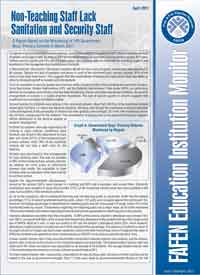ISLAMABAD, 28th April, 2011: A majority of government boys’ primary schools, monitored during March 2011, did not have the services of sanitary and support staff. According to FAFEN’s Education Institution Monitor, as many as 94% of monitored schools did not have a serving sanitary worker, 81% were without security guards and 70% did not have a peon. Non-teaching staff are important for providing support and assistance in the management and maintenance of schools.
FAFEN Governance Monitors visited 109 government boys’ high schools in 72 constituencies across the country in March 2011. Fifty one schools were monitored in 29 districts of Punjab, 31 in 21 districts of KP, six in as many districts of Balochistan, 18 schools in 13 districts of Sindh, one in ICT and two schools in as many districts of FATA.
In the monitored 109 schools, 102 lacked a sweeper, 88 did not have a security guard, and no peon was appointed in 68 schools. Despite this lack of sweepers and peons in most of the monitored boys’ primary schools, 81% of the schools had clean classrooms. This suggests that the responsibility of keeping the classrooms clean was taken up either by the teaching staff or transferred to the students. Similarly, the non-availability of security guards was a serious safety concern in light of the prevailing law and order situation.
General facilities for students were lacking in the monitored schools. About half (49.5%) of the monitored schools lacked basic furniture, i.e. chairs and tables for students, 75% did not have a playground for the students and 39% lacked arrangements for clean drinking. Facilities for teachers were also observed to be missing in many schools as insufficient basic furniture was found in the classrooms of more than one fourth (27%) of the monitored boys’ primary schools, while 78% of the monitored schools did not have a staff room for the teachers.
Despite the above-mentioned discrepancies, almost all the schools (94%) were housed in a building and 80% had a boundary wall around them. Electricity connections were available in about three fourths (74%) of the monitored schools while fans were available in the class rooms of 66% of the monitored schools.
A lower student-teacher ratio in the class allows better coordination between teachers and students, but the student-teacher ratio in almost all the schools in the monitored regions was quite high. The highest student-teacher ratio was observed in KP, where one teacher was responsible for an average of 43 students. The average student-teacher ratio in the monitored government boys’ primary schools remained high at 39:1.
The high student-teacher ratio, vacant posts, unavailability of clean drinking water, furniture and other facilities can be related to the lack of government oversight. Only 77 visits were made by government/elected officials to the 109 monitored schools during the quarter, December to February 2011 inclusive. No visit by the EDO Education or any government/elected personnel was made to the monitored school of Islamabad Capital Territory (ICT) in the observed quarter.
About FAFEN:
FAFEN is a network of 43 civil society organizations working to foster democratic accountabilities in Pakistan. It is governed by Trust for Democratic Education and Accountability.


